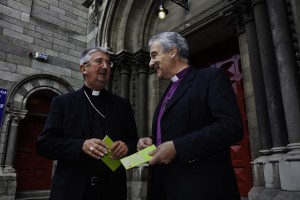
By Sarah Mac Donald - 15 December, 2013
 The Catholic and Church of Ireland archbishops of Dublin together marked the publication online last week of ancient Irish religious texts, some of which are over 400 years old.
The Catholic and Church of Ireland archbishops of Dublin together marked the publication online last week of ancient Irish religious texts, some of which are over 400 years old.
At the Royal Irish Academy in Dublin, Archbishop Diarmuid Martin said in his address that the presence of the two archbishops was an indication of “our desire to read and witness history together, so that we can build future together.”
“We archbishops and our communities face the challenge of re-reading history together so that we can overcome certain remnants of our history. We, as archbishops, have the challenge to ensure that we and our communities do not become trapped in what we think is our history, but may only be yesterday’s short-sightedness,” Archbishop Martin said.
He said there were many texts and prayers in the archive which predated “divisions and which form part of what we share in common.”
The Online Archive of Religious Texts 1600-1882 and the Corpas na Gaeilge 1882-1926 were published as part of the Royal Irish Academy’s Foclóir na Nua-Ghaeilge project.
The religious texts include Eochair Sgiath an Aifrinn by the priest, poet and historian Seathrún Céitinn, composed ca 1615, and An Teagasg Críosdaidhe, by Bonabhentura Ó hEodhasa (1611).
Others texts include Leabhuir na Seintiomna translated by Uilliam Bedel, 1685, and Tiomna Nuadh ár dTighearna agus ár Slánuightheora Íosa Críost translated by Uilliam Ó Domhnaill, 1602.
The priest, Seathrún Céitinn (ca. 1569 – ca. 1644) who was known in English as Geoffrey Keating, was a 17th-century poet and historian.
In November 1603, he was one of forty students who sailed for Bordeaux under the charge of Fr Diarmaid MacCarthy to begin their studies at the Irish College which had just been founded in that city by Cardinal François de Sourdis, Archbishop of Bordeaux.
On hearing of the Flight of the Earls, he wrote ‘Lament on the Sad State of Ireland.’
He returned to Ireland in about 1610. His major work, Foras Feasa ar Éirinn (which literally means ‘Foundation of Knowledge on Ireland’ is more usually translated as ‘History of Ireland’) was written in Early Modern Irish and completed ca. 1634.
The Foras Feasa ar Éirinn traced the history of Ireland from the creation of the world to the invasion of the Normans in the 12th century, based on native historical and pseudohistorical traditions (including that of the Milesians), historical poetry, annals and ecclesiastical records.
The launch of the biblical and religious texts in the Irish language from 1600 to 1882 online was described by Archbishop Michael Jackson as a ‘freedom of information’ initiative – “without some of the associations so often linked with the more conventional use of the term: FOI.”
In his address, he said it would “widen and deepen the impact of faith and understanding as they engage with one another in a critical friendship which is always the very place to begin and end an argument about the things which really matter.”
Archbishop Martin concluded his address by warning that archives are not tombs.
“They are the perennial anti-chambers of something new, of understanding our common past, with its misunderstandings and failures, and of rediscovering history as wealth. History never ends; burying history is flight from reality.”
He added, “Opening archives can serve to open minds.”